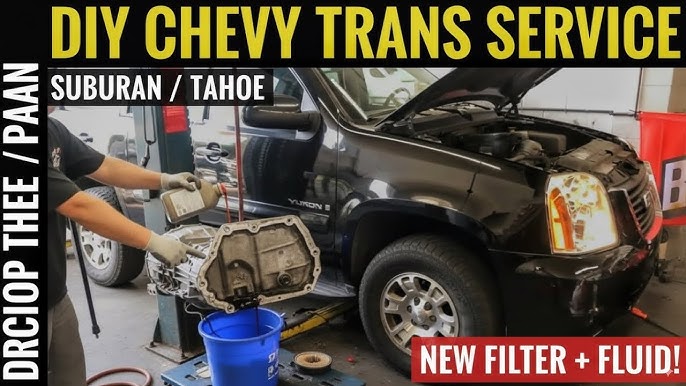If you own a Chevy Suburban, you know it’s built to handle tough jobs and long drives. But what happens when your transmission starts acting up?
Transmission problems can quickly turn your reliable ride into a source of stress and costly repairs. You might notice strange noises, slipping gears, or delayed shifts—signs that shouldn’t be ignored. Understanding these issues early can save you time, money, and headaches down the road.
Keep reading to learn what causes Chevy Suburban transmission problems, how to spot them, and what steps you can take to protect your vehicle and keep it running smoothly.
Common Transmission Issues
The Chevy Suburban is a popular SUV known for its size and power. But many owners face common transmission problems. These issues affect driving comfort and vehicle safety. Knowing these problems helps you spot trouble early. It also guides you on when to see a mechanic.
Slipping Gears
Slipping gears happen when the transmission shifts unexpectedly. The SUV might lose power or feel jerky. This issue can cause unsafe driving conditions. Worn-out transmission parts or low fluid often cause slipping. Checking the transmission fluid regularly can prevent this problem.
Delayed Shifting
Delayed shifting means the transmission takes time to change gears. You may notice hesitation or rough shifts. This problem can damage the transmission over time. Dirty fluid or a failing sensor might cause delays. Timely maintenance can keep your Suburban shifting smoothly.
Transmission Overheating
Overheating harms the transmission’s internal parts. It often happens during heavy towing or hot weather. Overheated transmission fluid loses its ability to lubricate well. This can lead to costly repairs. Regular fluid checks and cooling system care help avoid overheating.
Fluid Leaks
Fluid leaks lower the transmission fluid level quickly. You might see red or brown puddles under your vehicle. Leaks come from worn seals or damaged transmission lines. Low fluid causes slipping and overheating issues. Fixing leaks early protects the transmission’s health.

Credit: autolemonlawyer.com
Main Causes Of Problems
Transmission problems in a Chevy Suburban often come from a few key causes. Understanding these helps spot issues early and avoid costly repairs. Each cause affects the transmission’s ability to shift smoothly and deliver power.
Worn Clutch Plates
Clutch plates wear out over time and use. They can slip, causing delayed or rough gear shifts. This wear reduces the transmission’s grip on the engine power. Drivers may feel a burning smell or notice poor acceleration.
Faulty Torque Converter
The torque converter sends power from the engine to the transmission. If it fails, the transmission can slip or overheat. This causes shaky starts and strange noises. A bad torque converter can also lower fuel efficiency.
Low Transmission Fluid
Transmission fluid lubricates and cools moving parts. Low fluid levels cause overheating and gear slipping. Leaks or neglect lead to low fluid. Checking fluid regularly prevents damage and keeps shifting smooth.
Damaged Valve Body
The valve body controls fluid flow inside the transmission. Damage or blockages can cause erratic shifting or stuck gears. Dirt or wear can harm the valve body. Repairing or replacing it restores proper transmission function.
Diy Fixes And Maintenance
Maintaining your Chevy Suburban’s transmission can save you time and money. Simple fixes and regular care help keep the transmission healthy. Basic maintenance often prevents bigger issues down the road. Let’s explore some easy steps you can do yourself.
Checking And Changing Fluid
Transmission fluid keeps the parts moving smoothly. Check the fluid level with the engine running and the car on level ground. The fluid should be bright red and clear. Dark or burnt-smelling fluid means it needs changing. Drain the old fluid and refill with the correct type. Fresh fluid helps the transmission shift better and last longer.
Resetting Transmission Control Module
The Transmission Control Module controls gear changes. Sometimes it needs a reset to fix shifting problems. To reset, disconnect the battery for about 15 minutes. This clears error codes and can improve performance. Reconnect the battery and start the vehicle. This simple step often fixes minor transmission glitches.
Replacing Filter And Gaskets
The transmission filter traps dirt and debris. Over time, it clogs and reduces fluid flow. Replace the filter to keep the system clean. Gaskets can wear out and cause leaks. Inspect gaskets and replace if needed. New gaskets prevent fluid loss and protect the transmission’s inside parts.
When To Seek Professional Help
Knowing when to seek professional help for Chevy Suburban transmission problems saves time and money. Early detection avoids bigger repairs and keeps your vehicle safe. Pay attention to signs that your transmission needs expert care. Acting quickly can prevent serious damage and costly fixes.
Persistent Warning Lights
Warning lights on the dashboard may signal transmission trouble. Lights that stay on after starting the engine need immediate attention. Ignoring these signals can lead to severe transmission damage. A mechanic can diagnose the exact cause and offer proper solutions.
Strange Noises Or Smells
Unusual noises like grinding or whining may come from the transmission. Burning smells often mean overheating or fluid issues. These symptoms indicate the transmission is struggling. A professional inspection finds the root cause and prevents further harm.
Complete Transmission Failure
A vehicle that won’t shift gears or move has likely suffered transmission failure. This problem makes driving unsafe and impossible. Immediate professional help is essential to assess and fix the issue. Delaying repairs can cause more damage and higher costs.
Tips To Prevent Transmission Problems
Preventing transmission problems in your Chevy Suburban keeps it running smoothly. Taking simple steps helps avoid costly repairs and extends the life of your vehicle. Regular care protects the transmission from damage and maintains performance.
Regular Fluid Checks
Check the transmission fluid often. The fluid keeps the transmission parts cool and lubricated. Low or dirty fluid causes slipping and overheating. Use the recommended type of fluid for your Suburban. Replace or top off fluid as needed to keep it clean and full.
Avoiding Heavy Towing
Heavy towing strains the transmission. Your Suburban has towing limits. Exceeding these limits can cause overheating and damage. Use a proper towing setup and stay within the weight capacity. This reduces wear and helps the transmission last longer.
Timely Service Intervals
Follow the service schedule in your owner’s manual. Regular transmission service catches problems early. Mechanics check fluid, filters, and other parts. Delaying service risks serious damage and expensive fixes. Keep up with maintenance to keep your Suburban’s transmission healthy.

Credit: www.youtube.com

Credit: www.reddit.com
Frequently Asked Questions
What Are Common Chevy Suburban Transmission Problems?
Common issues include slipping gears, hard shifting, delayed engagement, and transmission fluid leaks.
How Can I Tell If My Suburban’s Transmission Is Failing?
Signs include strange noises, burning smell, rough shifts, and warning lights on the dashboard.
What Causes Chevy Suburban Transmission To Slip?
Low fluid, worn clutch plates, or damaged gears often cause the transmission to slip.
Is It Expensive To Fix A Suburban Transmission Problem?
Repair costs vary but can be high, especially for major transmission rebuilds or replacements.
How Often Should Transmission Fluid Be Changed In A Chevy Suburban?
Changing transmission fluid every 30,000 to 60,000 miles helps prevent many transmission problems.
Conclusion
Chevy Suburban transmission problems can affect your driving experience. Catch signs early to avoid costly repairs. Regular maintenance helps keep your transmission healthy. Don’t ignore strange noises or slipping gears. Taking quick action saves time and money. Trust your instincts when the transmission feels off.
Keep your Chevy running smoothly for many years. Stay informed and take care of your vehicle. Simple steps can prevent bigger transmission issues. Drive safe and enjoy your Suburban every day.
